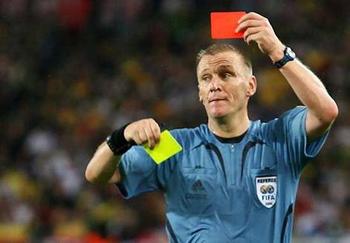The decision to disallow Roland Lamah's goal for Swansea City yesterday is the latest in a long line of events which have highlighted the latent need for more technology in football, in an effort to reduce the amount of errors seen in what is now a multi-billion pound industry. The fact it is still down to, potentially, one man, with a bad view, who has just sprinted 60 yards and has thousands of people shouting at him, to make a decision which could cost a team £40million (the average net worth of a season in the Premiership) is absolutely ridiculous. In an age where other sports have engaged this technology with open arms (and in some sports it actually seems to add to the drama) it seems remarkable that football has dragged its feet, kicking and screaming, to the table.
Thankfully, the Premier League announced on March 1st that from next season all twenty Premier League clubs, including those promoted, will utilise goal-line technology. To me though, if you're in for a penny you're in for a pound. The two companies whom the Premier League are in discussions with (Hawkeye & GoalRef) employ different systems which will send the referee's wristwatch a message within seconds, telling him whether the ball did indeed cross the line. This begs the question though - what's the problem with having a video referee as well? In rugby they stop the clock, but in football the fact it runs on means in EVERY single match huge amounts of time are lost as players remonstrate, moan, and roll around feigning injury. I'd argue that a video referee could, most of the time, make a correct decision after viewing multiple camera angles before the referee could restore order on the field. In Roland Lamah's case, it would have literally taken seconds to establish no Swansea player had touched his original shot, and that would have been it, job done. No, that makes too much sense.
 How's this for a theory; FIFA and the powers that be are aware that controversy sells papers, and creates interest, which is ultimately (in their minds) good for the game. These people don't see the stirring unease most football fans have with "21st century footie", where primadonnas earn more in a week than I'll earn in two decades, and don't realise that there must soon be a tipping point, as increased ticket prices, and general cost of following a football club, threaten to drive away fans. Much like, in my opinion, the smoking ban in the UK - the people in charge realise if they actually get rid of the problem, they're going to be down massively in terms of revenue, and this is not something they want. Much better to make a series of token gestures which purport to be trying to ease the problem, but in reality have little effect other than infuriating those affected. I cannot remember the last time I heard news from FIFA or UEFA's top brass, where I thought "Wow, they're doing something good for football" - but if you ask whether I can recall decisions they've made which create more financial gain for the game in general, then yes, I know of some. The decision to bring in goal-line technology, is, to me, nothing more than a token gesture, designed to placate those calling for technology which would help the match officials.
How's this for a theory; FIFA and the powers that be are aware that controversy sells papers, and creates interest, which is ultimately (in their minds) good for the game. These people don't see the stirring unease most football fans have with "21st century footie", where primadonnas earn more in a week than I'll earn in two decades, and don't realise that there must soon be a tipping point, as increased ticket prices, and general cost of following a football club, threaten to drive away fans. Much like, in my opinion, the smoking ban in the UK - the people in charge realise if they actually get rid of the problem, they're going to be down massively in terms of revenue, and this is not something they want. Much better to make a series of token gestures which purport to be trying to ease the problem, but in reality have little effect other than infuriating those affected. I cannot remember the last time I heard news from FIFA or UEFA's top brass, where I thought "Wow, they're doing something good for football" - but if you ask whether I can recall decisions they've made which create more financial gain for the game in general, then yes, I know of some. The decision to bring in goal-line technology, is, to me, nothing more than a token gesture, designed to placate those calling for technology which would help the match officials.In 2010/2011, for example, there were only four incorrect goal-line decisions (which the new systems being brought in would eradicate), however there were over ONE HUNDRED AND FIFTY wrong decisions regarding goals related to the offside rule. Quite incredible then, that they aim to do nothing about the big picture, but, like I say, controversy surrounding match officials has so long been a staple of the mainstream media that if it were completely removed what would the ten-a-penny pundits on Sky Sports & ESPN (as well as the journalists in the red-tops) talk about? It does seem a stretch to suggest that they are deliberately allowing referees to continue making incorrect decisions because they believe it helps keep football at the forefront of international media, but the continued refusal to implement simple, effective measures which would easily solve most of, if not all of these problems, does surely indicate some kind of agenda we mere mortals aren't privy to.
Or maybe I actually am a bit of a conspiracy theorist after all...
